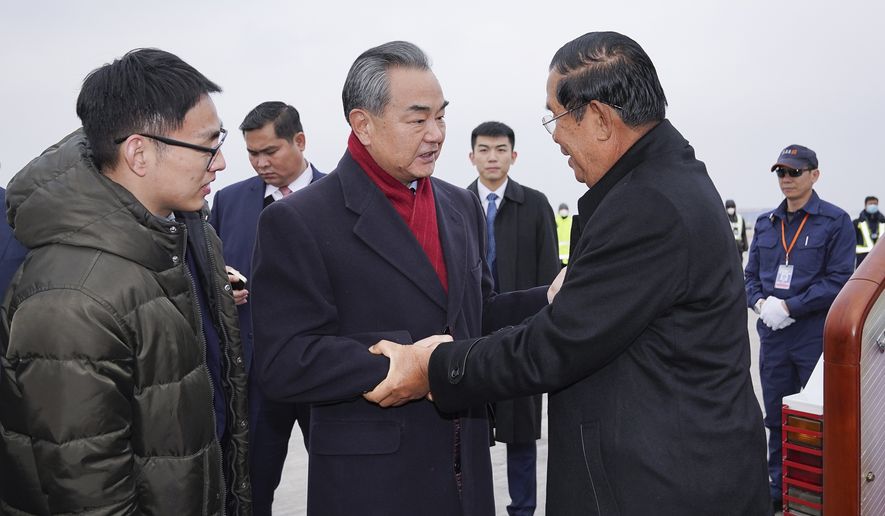BANGKOK — Authoritarian Prime Minister Hun Sen is dismissing the danger of COVID-19 to Cambodia, even while much of the rest of the world works overtime to limit their ties to China and their exposure to the deadly virus.
The Cambodian leader, who has cultivated closer economic and security ties with China during more than three decades in power, refused to organize an evacuation of Cambodian nationals trapped in China, where more than 1,000 people have perished from the disease.
He paid a high-profile visit to Chinese President Xi Jinping last week while officials in Beijing and Wuhan were reporting alarming increases in deaths and infections. He is the first foreign leader to visit Beijing since coronavirus infections expanded beyond the first affected city of Wuhan.
“What is more terrible than the epidemic is the panic itself,” Mr. Hun Sen told his host in a meeting heavily covered by China’s state-dominated media.
The prime minister has refused to wear a face mask to protect against infection, and he castigated reporters and government officials at a news conference in Phnom Penh this month for refusing to follow his example.
“The prime minister doesn’t wear a mask, so why do you?” he asked angrily at one point.
In the most dramatic illustration to date of Mr. Hun Sen’s outlier status, Cambodian officials said they would welcome the cruise ship MS Westerdam, carrying more than 2,000 people including about 600 Americans, at the port of Sihanoukville on Thursday. Neighboring Thailand and three other countries refused to allow the ship to dock.
“Westerdam is now sailing for Sihanoukville, Cambodia, arriving at 7am local time on Feb. 13 & will remain in port for several days for disembarkation,” Holland America Line announced Wednesday on Twitter. “All approvals have been received & we are extremely grateful to the Cambodian authorities for support.”
Betting on China
Analysts say Mr. Hun Sen is clearly betting that his contrarian stance will pay dividends with China, an increasingly important source of business and investment as Western countries pull back. While the cruise liner was steaming toward Sihanoukville, the European Union announced it was preparing new trade sanctions on Phnom Penh over the government’s record on civil liberties and labor rights.
China’s infrastructure investments in Cambodia include seven hydropower dams that supply half of the country’s electricity.
Chinese companies have laid more than 1,800 miles of roads and bridges over the past two decades.
More than 250,000 Chinese citizens live in Cambodia, constituting about 60% of all foreign residents in a country with a population of about 17 million, according to the Interior Ministry.
In Sihanoukville, Chinese investors control about 90% of the hotels, factories, apartments, restaurants and massage parlors and 80 casinos. The Sihanoukville Special Economic Zone is a Chinese-Cambodian tax free economic area linked to Mr. Xi’s pet Belt and Road Initiative.
Asked in Beijing why Cambodia was not following the lead of the U.S. and other countries by restricting or blocking visitors from China, the prime minister replied, “There is no need to stop flights from China because doing so would kill our economy and destroy ties with China.”
Critics say unregulated Chinese cash flooding into Cambodia is fueling corruption, crime, ecological degradation and a lopsided dependence on Beijing. Although open dissent is difficult, Cambodians have pelted Mr. Hun Sen online with outrage and mockery over his open-door policy in the face of the health emergency.
Mr. Hun Sen, one of the world’s longest-serving leaders, has cultivated a tough image from his early days as a midlevel field commander for the infamous Khmer Rouge in Cambodia’s guerrilla wars of the 1970s. After defecting to Vietnam in 1977, he returned to Cambodia a year later atop a Vietnamese invasion, toppling Khmer Rouge leader Pol Pot and leading to Hanoi’s 10-year occupation of Cambodia.
Mr. Hun Sen became prime minister in 1985 and has effectively dominated the political landscape ever since.
He has cited his colorful background while arguing that Cambodians need not cower in the face of a microscopic organism. Cambodia has registered one confirmed case of COVID-19, a single visitor from China, despite its commercial links and popularity as a destination for Chinese tourists.
“We have already tasted countless wars and tragedies they had made for us, but we are not dead,” the prime minister said this week.




Please read our comment policy before commenting.